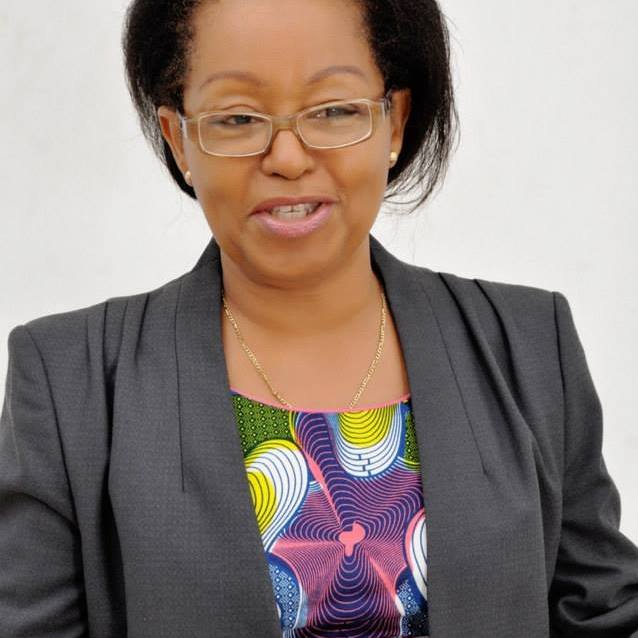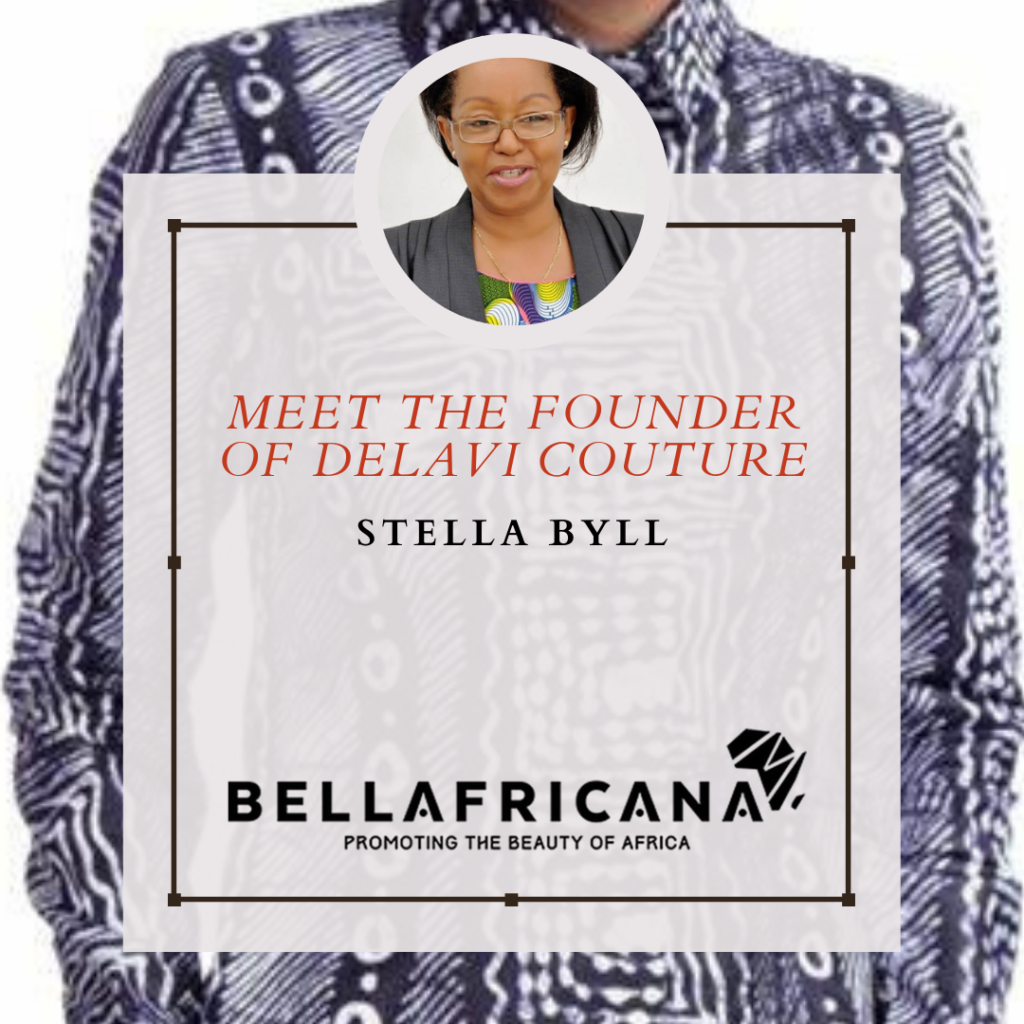Extracts from An Interview by Christy Anyanwu – Reporter for “The Sun” (November 3, 2013)
MEET THE FOUNDER OF DELAVI COUTURE

She is simple but elegant with a bias for the African sense of dressing. In her designs, she works with African prints. Her fabrics are of good quality and her designs are inevitably ethnic. In this interview, Stella Byll revealed why she loves working with prints and how it has been living and doing business in Nigeria.
African fabrics add colour, variety to designs –Stella Byll
Q & A
Please introduce yourself…
My name is Stella Byll. Byll is my maiden name and I am used to it . I am Togolese by birth and I have lived here all my life except for a brief period I went to study abroad. In Francophone Africa, your name is the name you were born with. I am married to a Nigerian and we’re blessed with children. Basically, I am a Nigerian too. I studied textile marketing at Selford College of Technology in Manchester and I did my MBA degree at the University of Liverpool. I have been into fashion designing since I was about 17. It was an accident really. I was in England and I couldn’t find anything that fitted me because I was pretty small myself, so I started making clothes. I bought magazines and catalogues featuring exactly what I wanted. When I came back here, I was in paid employment for about 10 years and then I wanted to go back to sewing. I like dress making, especially with African fabrics. I think African fabrics are wonderful for our environment. They add so much color and variety and you can do so many designs with them. That’s what I have been doing since 1990, but I took a break in year 2000 and worked at a school. Since then, I have been back and I don’t see myself going anywhere else.
Tell us about your childhood…
My father worked for UAC and we used to travel around quite a bit, because he was a produce manager. We lived somewhere for nine months and we moved to another place thereafter. Until the early sixties, he decided to settle in Lagos. I grew up here. Nigeria was a lovely place to live. There was hardly power outage. We had pipe-borne water and the place was safe. People were nicer. In those days, when you needed soft drinks you could leave your bottles at your gate as well as your cylinders if you needed cooking gas and when the vendors came you paid. Now, you have to keep your gates locked. Nobody had generators and we didn’t have bore holes. People had very good quality of life. Gradually, things have degenerated to what it is. Lagos was much cleaner than what it is now.
How long have you been in Nigeria?
Since I was a baby. My father was working here, but my mother had to go home to have me. I could have been born here. I have lived in Benin, Owo and Ijebu-ode. I’m quite used to Nigeria. I have been in Lagos for years. I used to ride on the old Carter Bridge that was built by the colonial people. That was the only bridge then linking the mainland to the island.
What’s your brand name?
My brand name is Delavi couture. We started by making things for children and it’s been an uphill task, but at the moment we are comfortable with it. People are tired of tailors who disappoint them, so they are ready to look on our racks and pick what they like.
Your fabrics are unique, how do you get them?
What I’m particular about is that fabrics should be made in Africa. I don’t want to do Chinese fabric. I believe we should be promoting African culture and things that are made here. We need the job, our population needs to earn more. I use African fabrics. I use Kente, Aso oke and beautiful prints from Togo and Benin Republic as well as Batik from Ghana. In Nigeria, we used to have lovely prints including wax but a lot of our factories have closed shop as it’s a bit expensive to do business.
Where is Delavi couture?
At the moment, we are operating from my home in Ikota estate. I’ve got everything in the same location for convenience, security and of course for financial reasons. We have just been given the opportunity to display our products at the Marina/ Broad Street axis at the old Kingsway Store building.
There is an organization that has a large floor space on the ground floor and we have been asked to take part of that space. We hope to open there soon. We want to be ready before Christmas rush. It’s in a more commercial environment where people will see more of what we are doing.
Who do you make clothes for?
I have a lot of customers from the diplomatic corps, foreigners, working class people, basically, anybody who likes well made stuff. People who appreciate good fabric. Our finishing is very good. We also produce to international standard.
Do you cater for plus-sized women too?
We design for all and especially the African who may not be a lepa and with ikebe.
What did you study?
I studied textile marketing and then I came back to Nigeria to work. Subsequently, I decided to do my masters. I did my MBA at the University of Liverpool. It was 100 percent an online program but I went to the university to collect my diploma. I graduated the same year my daughter obtained her first degree. I had to do an MBA to be able to run my business better. I did my dissertation on promotion and growth of small and medium scale businesses in Nigeria. We read in the papers all the time that small scale industries are the back bone of the economy in any nation. In Singapore, it has grown the economy, in India the same thing. We talk about it here too. I did that, because I wanted to find out more about small scale businesses, so I went round the agencies, I went round the banks and I found out we are talking about them but we are not promoting small businesses. We need to create jobs.
What are challenges you face in business?
Lack of steady power supply and it’s killing businesses. All our textile producers left Nigeria for other business-friendly climes like Ghana. If you want Nigerian wax, you have to import it from Ghana. We need the jobs here. We need to grow this economy. Dunlop is gone, which factories do we have here again?
All the textiles firms are gone and we grow cotton here. Everything is in Ghana. So we are importing fabrics from Ghana. It’s a shame. Our leaders should listen to us. Let them hear the cry of the people and take action.
Could you tell us about your style?
My style is typically African and not the tight fitting stuff. Comfort is my major focus. I supervise tailors and I’m involved in production. You need to be comfortable and for me the most comfortable thing in this environment is cotton. My style is simple and well fitted. That’s very important to me.
How do you spend your day?
I leave my house at 8:16am for work-outs at Ikoyi Club, because exercise is fantastic and it starts my day off very well. Since I work at home most of the time, I come back home. If I have meetings and anything to do in town, I dress-up from the club, attend the programs and return home. I spend most of my day working.
How do you relax?
Swimming relaxes me and I go for long walks too. The conservation park here is a wonderful place to spend an afternoon. I like the beach too.
I’m not very fond of parties, but of course you can’t live in Lagos and not go to parties. People invite me to parties but I don’t attend all. I find them too noisy.
Quite often, the food is not good quality, because they are catering for too many people. Once in a while, I go to parties and the church. I’m catholic. My children are all away.
My son is in England and my daughter at the moment is in the USA.
Delavi Couture has been in existence since 1995, and Bellafricana has just recently teamed up with her to bring you the best of men and women wears.
website: www.delavi.org or www.bellafricana.com



